The Corne¬ Daily Sun



Cornell’s negotiation process with the City of Ithaca over its financial contributions to the City in the form of payment in lieu of taxes have ceased to progress as of Aug. 11, Mayor Laura Lewis wrote in a Sept. 7 press release.
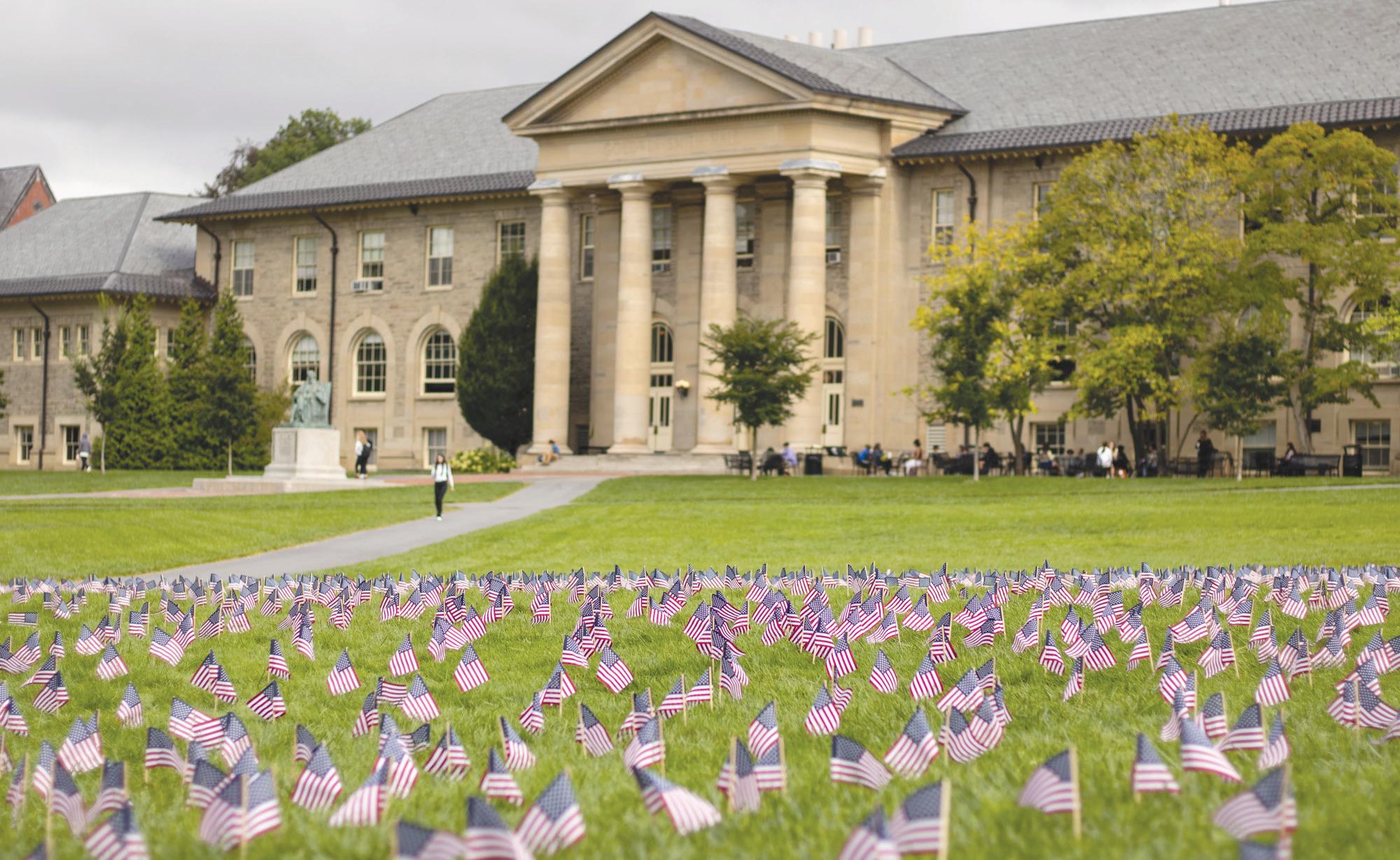
“The city entered the process motivated by a core belief that despite the tremendous overall economic impact the university community brings to the region and the city, Cornell’s direct financial contributions to the City are fundamentally lacking and fail to demonstrate a commitment to the needs of Cornell’s host city,” Lewis wrote in the statement.
As a higher education institution, Cornell is exempt from paying property taxes, but instead offers the City voluntary PILOT contributions. The University currently pays the City $1.6 million annually, which was dictated by a memorandum of understanding that outlined the amount Cornell contributes to the city since its inception in 1995. The MOU is set to expire in June 2024.
Between April and August, four negotiation sessions were held between City and University officials, during which the City presented its proposal that Cornell pay around $8 million annually.

Lewis said that the City arrived at the $8 million figure based on projections of Cornell’s tax-exempt real estate hold-

The Ithaca Common Council voted to change its payment structure for its members. At the Wednesday, Sept. 6 meeting, the Council decreased Ithaca’s mayoral salary by over 50 percent and increased the salary of Common Council alderpersons from $13,141 to $17,091, effective Jan. 1, 2024, when the new mayor and Council members are sworn in.
This change comes due to the newly-developed city manager position, which will absorb “a majority of the Mayor’s current duties,” according to the Sept. 6 Common Council meeting agenda.
The salary of Ithaca’s mayor was reduced from $61,489 to $30,000, representing a 51.2 percent decrease in salary. The previous salary was set in January 2022, raised from the previous salary adjustment of $58,561 in January 2016, when the mayor played a larger role in managing the City than they will in the upcoming year.
The alderperson salary raise — from $13,141 to $17,091 — represents a 30.1 percent increase. The law changing salary rates was passed with the justification that the city manager position would lessen the workload of the city’s mayor. The council established the revised salary amounts in an Aug. 9 special meeting.
“The city is undertaking a transition, as we all know, to [a] city manager form of government,” Mayor Laura Lewis said. The City is actively recruiting for a city manager, whose salary will be between $160,000 to $185,000, as unanimously agreed upon in an Aug. 2 meeting. According to the City of Ithaca website, “with salary and benefits the Mayor, the Mayor’s executive assistant and the Chief of Staff cost the City approximately $213,000 [and] under the new structure, the fulltime city manager will earn a bit more than the Chief of Staff and the Mayor will earn slightly less than the current Mayor.”
First introduced to Ithaca by former Mayor Svante
ings. Cornell’s property represents 45 percent of the city’s assessed property value, which would equate to approximately $33 million in property taxes paid to the City if Cornell was not tax-exempt. The City benchmarked its proposals against 25 percent of the $33 million.
Cornell’s latest offer to the City was approximately $3.15 million annually. The City responded by proposing a $5 million contribution, but Cornell indicated it would not offer any additional increase from the $3.15 million proposal, according to Lewis.
“To demonstrate what is Cornell’s deep commitment to the City, we have proposed more than doubling that voluntary contribution to $3.15 million a year,”
The Student Assembly unanimously passed a resolution that exempts Haven, the Cornell LGBTQ+ student union, from disclosing their members’ names, a new requirement to apply for funding from the University, in a Thursday, Sept. 7 meeting.
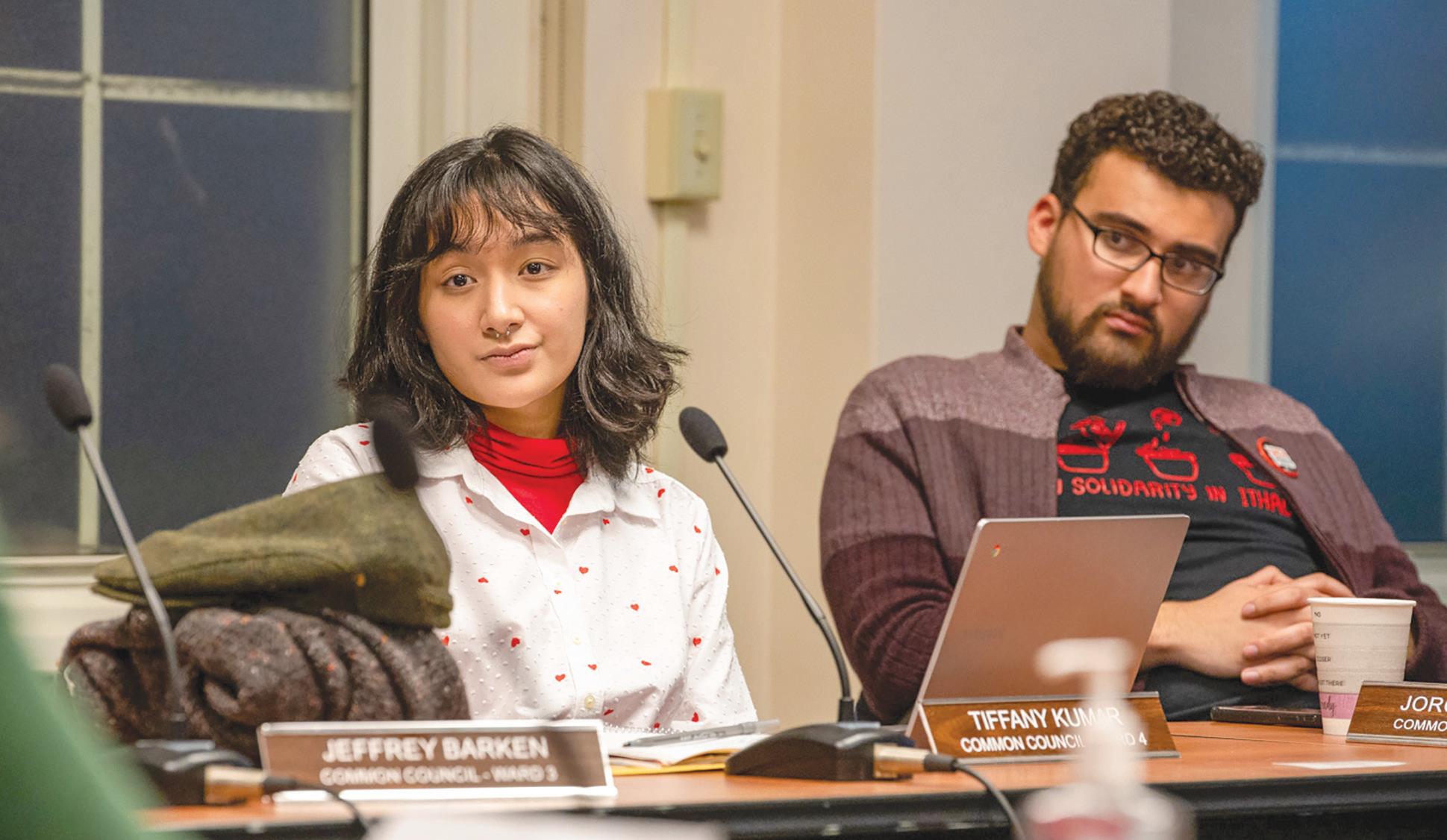
Haven, as a byline organization, receives money from the student activity fee, a mandatory fee which all students pay to fund student organizations. Byline-funded organizations each get a fraction of the student activity fee, which they use to fund their projects or subsidiary campus organizations. Campus organizations applied to receive byline funding for the 2024-2026 cycle until Sept. 8, and funding decisions are made by the Student Assembly by the end of the fall semester.
Resolution 16: Allyship to the Cornell LGBTQ+ Community, was sponsored by assembly members Karys Everett ’25, LGBTQIA+ liaison at-large, Claire Ting ’25, executive vice president and Aissatou Barry ’24, vice president of diversity and inclusion and minority students liaison at-large. The
resolution was introduced alongside Piper Kohlenberger ’25 and Nic Oke ’26, co-presidents of Haven.
Under the current student activity fee organization application — the form student organizations used to request funding from the student activity fee — aspiring byline-funded student organizations like Haven were required to provide all the names of its members in order to verify membership and engagement in the organization. According to the resolution, Haven lacks autonomy of where this information goes or who receives it, which can damage the “foundation of safety Haven has spent years cultivating.”
Ting said that the byline application process, requiring the disclosure of Haven members’ names, can have many
“Allyship isn't purely social, it must also be structural.”
Claire Ting '25
Tuesday, September 12, 2023
Turkish Conversation Hour
10 a.m., G25 Stimson Hall
Thriving in Space: Decadal Survey Public Release With Krystyn J. Van Vliet
10:30 a.m. - Noon, Virtual Event

Microeconomic Theory Workshop: William Fuchs
11:35 a.m., 494 Uris Hall
BEDR Workshop: Devin Pope
11:40 a.m., 165 Statler Hall
Econometrics Workshop: Thorsten Joachims
11:40 a.m., 498 Uris Hall
MindWell Faculty and Staff: Practicing and Balancing Wellness
Noon - 1 p.m., College of Veterinary Medicine Classroom 7
Romanian Conversation Hour
12:30 p.m., G25 Stimson Hall
MAE Colloquium: Prof. Ryan Caverly
1:30 p.m., B11 Kimball Hall
Dyson Study Abroad Information Session
3:30 p.m., 401 Warren Hall
PMA at Sundance 2024
3:45 p.m., 220 Schwartz Center for the Performing Arts
Hospitality Business Plan Competition
Pizza Social and Information Session
4 p.m. - 5:30 p.m., 189 Statler Hall
Spring Break Cultures, Communities and Development in Ecuador Information Session
4 p.m., B73 Warren Hall
The 2023 Daniel W. Kops Freedom of the Press Lecture, Jamelle Bouie, “Constitutionalism, Reform and the Press’ Role in Helping the Public Think About Institutions”
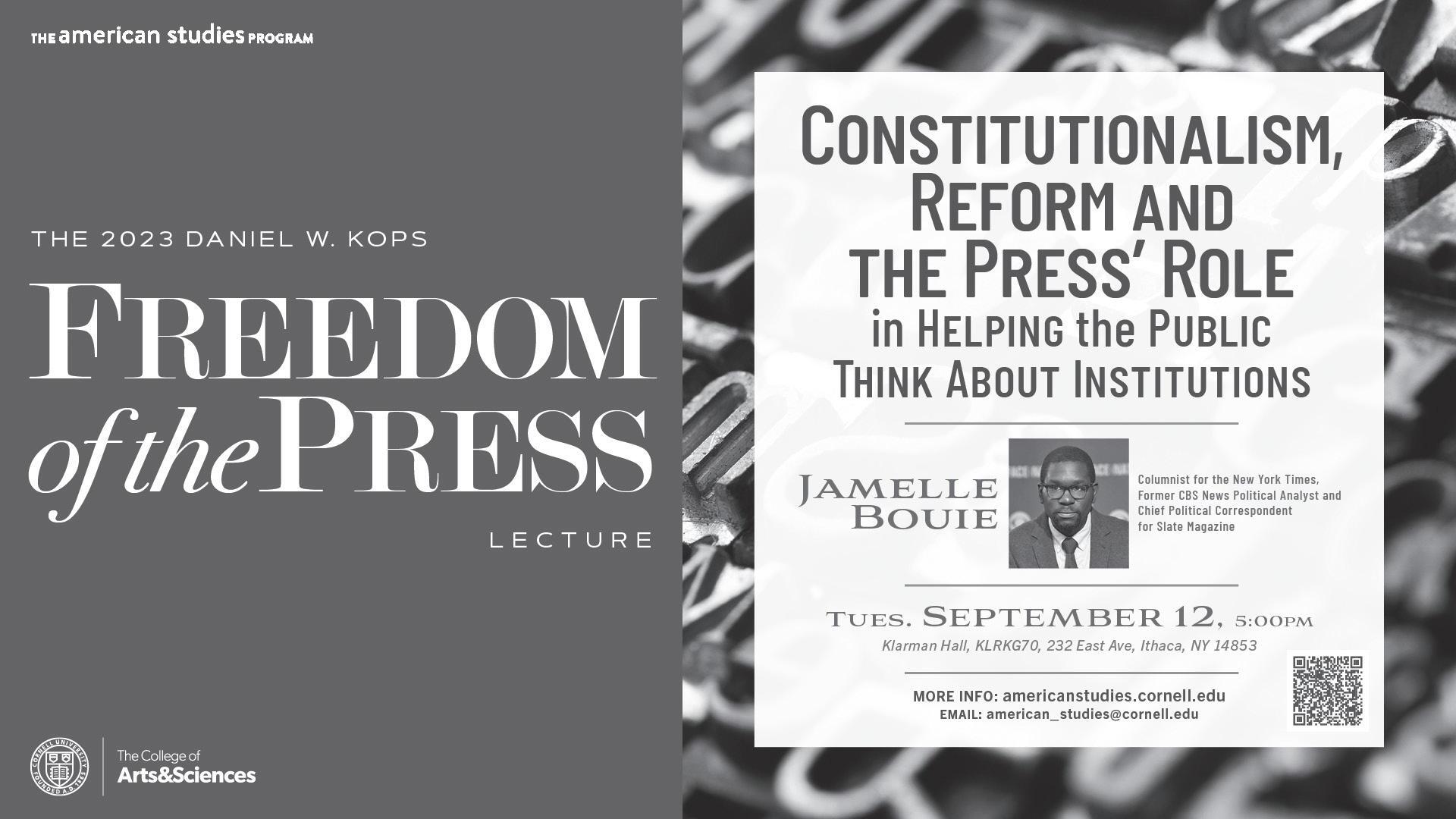
5 p.m. - 6:30 p.m., KLRKG70 Klarman Hall
Cornell Women in Business Forum
6 p.m., Kimpton Hotel Monaco
one for incoming freshmen in July — make for a total of 61 issues this academic year. Subscriptions are: $60.00 for fall term, $60.00 for spring term and $120.00 for both terms if paid in advance. Standard postage paid at Ithaca, New York. Postmaster: Send address changes to The Cornell Daily Sun, 139 W. State St., Ithaca, N.Y. 14850.
Cornell Law School kicked off the University’s highly anticipated free speech academic theme with a moderated discussion of the role of the First Amendment and academic freedom in the college setting on Thursday, Sept. 7. The panel is one of a series of campus events dedicated to “The Indispensable Condition: Freedom of Expression at Cornell.”
At the panel discussion titled “The Fundamentals of Freedom of Expression,” speakers included Prof. Karen Levy, information science, who specializes in the interactions between law, technology and surveillance, Prof. Michael Dorf, law, an expert on constitutional law and Prof. Nelson Tebbe, law, who has expertise in freedom of speech, freedom of religion and constitutional law.
In an interview with The Sun, event moderator Prof. G.S. Hans, law, explained that the event’s purpose was to advance shared understandings of the significance, history and legal contexts of free expression and academic freedom.
“We wanted to give students who may not have expertise in constitutional law and First Amendment issues a common understanding of its principles,” Hans said.
Dorf began the event by outlining the basic principles and purposes of the First Amendment.
“The First Amendment is a restriction on governments in the United States,” Dorf said. “The most obvious purpose
Myrick ’09 during his State of the City address in January 2021, the city manager position will “act as the executive for the business of running the City of Ithaca,” per the city manager recruitment brochure. Although the mayor will continue duties such as leading the development of policy, appointing boards and committees and serving as Ithaca’s ceremonial leader, the inaugural city manager will take on many former mayoral roles, like serving as the city’s chief executive officer, developing an annual budget and supervising department heads.
Soon after Myrick’s address, the Ithaca City Administration Council formally proposed the creation of the new role in April 2021. In November 2022, the issue made it to the ballot as proposition two, and Ithacans voted overwhelmingly to pass it with 78.96 percent of the vote.
Vying for a mayoral role with half the current salary include Democrat Robert Cantelmo, grad, and Republican Janis Kelly ’71, with the announcement of who will fill the city manager position to come.
that free speech serves is first to promote democracy — if people are going to make decisions about how they want to be governed, they need a free flow of information.
The second purpose of the amendment, Dorf said, is for the pursuit of truth.
“The idea here is that if you want to get the truth, whether it’s about public policy or your personal life, you need to express unpopular ideas,” Dorf said.
Tebbe pointed to the history lessons that contextualize the Supreme Court’s jurisprudence.
“After World War Two and the rise of McCarthyism — even though the Supreme Court was not as effective as you would have liked in policing and
ensuring free speech rights during that time — the lessons of those failures stuck with the court and with society in tenacious and important ways,” Tebbe said.
After Tebbe briefly reviewed the history of free speech, Levy discussed the future of the principle. She specifically clarified prominent misconceptions surrounding First Amendment rights and the internet.
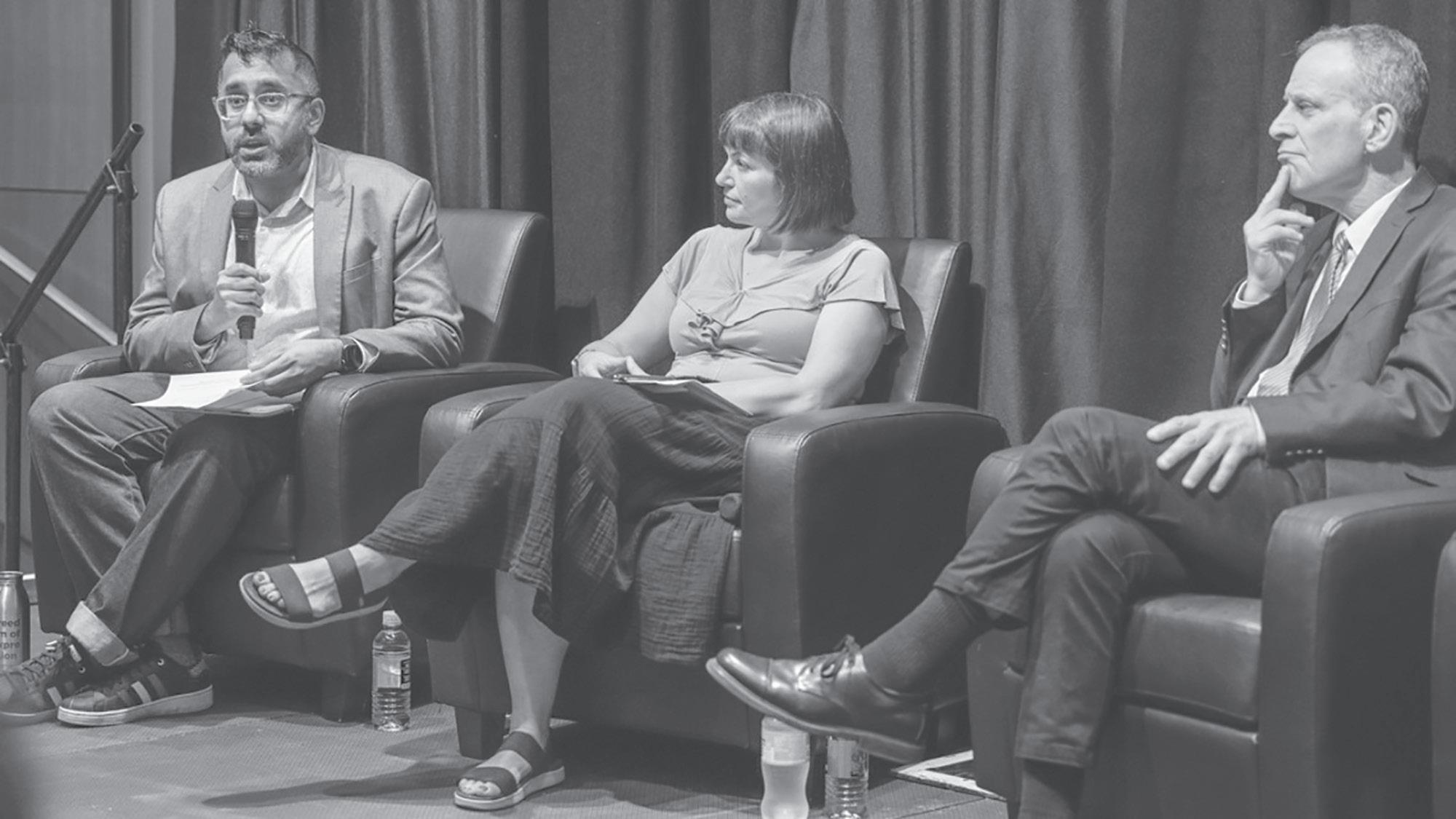
“People often say that these tech platforms act as public squares,” Levy said. “While I think there is some validity to that argument, that does not translate into some analogous principle that because speech happens on these platforms, these platforms constitute state actors.”
unintended consequences on the LGBTQ+ community.
“Not every member of Haven is publicly out, or comfortable with an affiliation with Haven,” Ting said. “That might cause undue threats to personal safety and other social-economic outcomes.”
While it may not typically harm members of other organizations, Kohlenberger said that disclosing Haven’s membership presents a valid threat.
“In our case, it presents a very real danger to our community,” Kohlenberger said. “I think for many other [organizations] that might seem OK to make sure that people are not fudging numbers or saying that they have more members than they actually do… [but] Haven’s membership list is confidential on Campus Groups and should be confidential for a reason.”
Starting this year, the vice president of finance lost administrative access to the CampusGroups platform — which has been the primary platform holding information about campus organizations, including lists of
membership, since fall 2019. In response, the S.A. passed Resolution 10 on Aug. 24, which urged Cornell Campus Activities to reinstate access for the 2023-2024 academic year. According to the resolution, Campus Activities has refused to grant access to the S.A. when previously asked, despite access being provided throughout the 2022-2023 academic year.
Resolution 16 said that this scenario made it difficult to “verify the validity of membership rosters,” which is why the Student Assembly is collecting member names through the application form.
Instead of naming its members in the byline funding application, Haven will instead only be required to provide data on the number of members and attendees at their events to “demonstrate its impact, utility and student engagement at Cornell,” the resolution states.
Oke noted Resolution 16 is important to ensure that alternative methods are used to identify the size of Haven so the organization can get the resources it needs to support members of Cornell’s LGBTQ+ community while still being a byline-funded group.
“We actually find that [disclosing members’ names] would be setting up a uniquely and disproportionately adverse impact on our ability to conduct future efforts for the organization if it became known by our members that they could not trust that their information and names would not be released to a third party,” Oke said.
Everett emphasized the role that elected student leaders have in shaping the policies at Cornell before voting for the resolution.
“This is a really great example to remind us that our positions on the assembly at the end of the day are to serve our community,” Everett said. “Even if a rule or phrasing may not affect many students, it still affects the students.”
In a follow-up interview with The Sun, Ting reflected on Resolution 16’s significant impact on Haven members.
“Resolution 16: Allyship to the Cornell LGBTQ+ Community serves to protect the marginalized queer community on campus,” Ting said. “Allyship isn’t purely social, it must also be structural.”
FUNDING
Continued from page 1
said Joel Malina, the vice president for University Relations, in an interview with The Sun. “While the prior agreement had 40 percent of the funds at the City’s discretion to use… we have approached this offer a little differently, where 80 percent of the money that we would give could be spent by the City any way it wishes.”
Malina added that while Cornell is proposing a MOU for a 20-year term, it would go into effect as soon as it is agreed upon, potentially being put in place for 21 years if enacted in the coming months. After increasing yearly for inflation, the total contribution over 21 years would be more than $83 million, according to Malina.
According to the University, Cornell currently spends nearly $29.2 million annually in expenditures that support the City and its residents, including around $5.9 million in contributions towards TCAT, the Community Housing Development Fund, Ithaca Area Economic Development and local non-profits. The figure also takes into account the $650,000 yearly contribution to the Ithaca City School District and a $100,000 proposed annual grant for faculty to work with the City on projects of mutual interest. The University also said it spends around $19.4 million annually for public safety, street paving, sewer, snow removal and other municipal services.
Lewis said that the City is planning its 2024 budget without any Cornell contributions, meaning the City will start the 2024 budget process with a $1.6 million hole in the budget. In her statement, Lewis said that Cornell’s final offer was the $3.15 million proposal. However, Malina said that negotiations are “absolutely not over.”
“What we indicated when we proposed this offer is that we felt it was generous. We felt we were comfortable with it. In no way did we intimate that discussions were over,” Malina said, adding that he had discussions with City officials as recently as today.
Local advocates have been pressuring Cornell to increase its contributions to the City for nearly 30 years. Most Ivy league institutions, including Princeton University, Yale University and Dartmouth College, pay PILOT contributions to their local municipalities. In fact, Princeton is the largest property taxpayer in Princeton, New Jersey, with about $6.2 million in voluntary property tax payments.
“Universities are all very different and their municipalities are all very different. The City of Ithaca is different in size and population to New Haven, Connecticut [and] to Princeton, New Jersey,” Malina said. “Those two universities have one municipality, our Ithaca main campus is situated in three municipalities. So it’s a difficult comparison.”
The University indicated that they are committed to the City of Ithaca and “have a real strong interest in the success of the City,” according to Malina. However, Lewis’ statement today and continued efforts by the Make Cornell Pay Coalition seem to indicate that not all community and Common Council members feel that same level of commitment.
“Despite a good faith effort to negotiate an amount compatible with the City’s needs, Cornell ultimately failed to offer a financial commitment reflective of its leading role in the community,” Lewis wrote. “This is a lost opportunity for Cornell to invest in and garner the support of its community.”
Levy noted some courts determined that media platforms themselves also have free speech rights. Part of the Communications Decency Act of 1996, section 230 allows social media platforms to moderate content without punishing them for doing so ineffectively.

On Friday, Sept. 8, however, the New Orleans-based U.S. Fifth Circuit Court ruled that the Biden Administration’s policing of social-media platforms regarding controversial topics including COVID19, election security and Hunter Biden violated the First Amendment. The White House cannot coerce online platforms to police protected speech, the ruling said.
“It’s well within [the platforms’] discretion to decide not to amplify certain content they find objectionable for pretty much any reason,” Levy said.

Tebbe then addressed the potential clash between protecting freedom of expression and promoting diversity, equity and inclusion — ideals that President Martha Pollack previously told The Sun are both essential to Cornell. In November 2022, students protested during a speaking event with Ann Coulter ’84 — a conservative media pundit and author. In April 2023, President Martha Pollack rejected Student Assembly Resolution 31, which urged instructors to provide content or “trigger” warnings about sensitive class content, such as sexual assault and self-harm.
“These days, there have been conflicts between freedom of expression and another commitment — the right of citizens to be free of structural injustice, to enjoy equal citizenship without stratification,” Tebbe said.
This tension, Tebbe said, often arises in discussions about academic freedom.
“This topic is highly charged largely because it often happens at a high



level of abstraction,” Tebbe said. “My real hope is that in a community like ours, that’s marked both by care for one another and also by intellectual rigor, we can group level solutions that both protect freedom of speech and also honor our commitments to respect one another.”
After a broad discussion about the many issues and applications of free speech, the panel moved into a question and answer session. The questions touched on navigating online and in-person environments where speech is increasingly contentious and sometimes untrustworthy.
Leo Glasgow ’26 asked the panelists for recommendations on promoting free speech in his personal life.
“Oftentimes, the people I love — my family, my friends — refuse to hear any opinions from the other side. I’m very afraid of this,” Glasgow said. “How am I going to be going through all this uncertainty? How am I going to encourage conversation?”
Tebbe responded by sharing advice from his own experiences.
“I have found that if I try to find the kernel of truth in what they’re saying and respond to that, then more often than not, it sort of disarms, and that’s when you can have a real conversation,” Tebbe said.
In a follow-up interview with The Sun, Glasgow said that the event enforced his belief in the importance of promoting free speech.

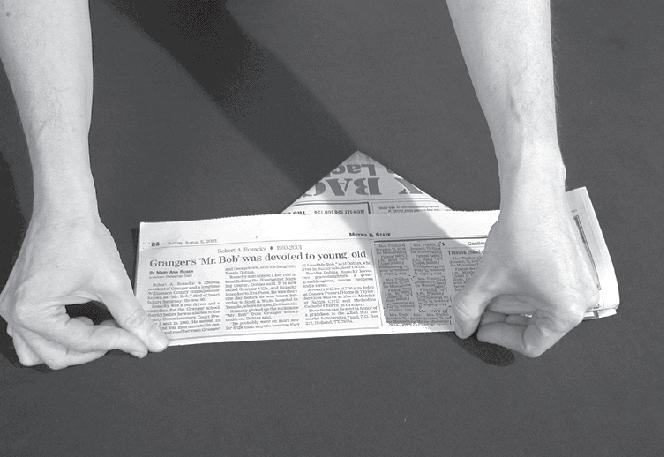




“My main takeaway is that we, the youth, will have so much to grapple with in the coming years, and we really have to figure out what kind of values we want to protect,” Glasgow said. “I’m never of the belief that we should shun speakers that conflict with my viewpoint — it’s something we’ve seen on a lot of college campuses. That’s what I mean about being part of that change and hopefully, all of us can start listening to each other more.”
Cornell eHub, a space where students with entrepreneurial ambitions can display and generate their unique business ideas, kicked off its programming for the academic year Wednesday, Sept. 6 at the eHub location in Collegetown with eShip, a pitch event for select applicants.
These applicants — Jonah Gershon ’24, Rachel Bonnet ’24 and Armita Jamshidi ’25 — had the opportunity to showcase their diverse ideas to judges Prof. Matt Marx, applied economics and management, and Zach Shulman, the director of Entrepreneurship at Cornell, a university-wide program supporting the entrepreneurship ecosystem that manages eHub, and compete for a $1,000 seed grant.
“I think that entrepreneurship at Cornell is a fabulous system,” said Nancy Almann ’83, the co-managing director of Blackstone Launchpad — a program designed to help university students with their entrepreneurial ventures. “I meet so many students with fantastic ideas, and I learn from them every day.”
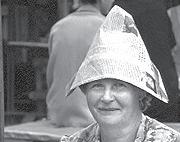
Gershon won the seed grant with his product Spekld, the first brown butter stick product. He had previously won $20,000 in the inaugural Northeastern Dairy Product Innovation Competition, a competition for innovators in the dairy field working with products sourced from the Northeast.
“I’ve competed in a lot of pitch competitions,” Gershon said. “I’ve always placed in second or as a finalist, and I’ve never actually come in first place in one, and it feels good.”
Gershon highlighted eHub’s array of connections for accepted students. He attributes some of his success to the resources Cornell eHub has to offer.
“I’ve spoken to a few people who’ve been in [eHub] before,” Gershon said. “They get a lot of
value out of the network and just being around other people who are involved in entrepreneurship who have their own startups.”
Cornell was ranked as the sixthbest university for startup founders by Pitchbook, with 826 founders and 772 companies coming from Cornell alums.
“Things have been very successful,” Shulman said. “Cornell views entrepreneurship as a cross-disciplinary sandbox where everyone plays together. When it comes to entrepreneurship, we all work together with a collective good, and that’s why Cornell ranks so high in my view.”
At the competition, Marx emphasized Cornell’s entrepreneurship minor, which has recently undergone curriculum changes.
“What we’re trying to do is get people educated on things like entrepreneurial strategy,” Marx said. “There are all kinds of things we want to teach people so that they don’t make the mistakes that a lot of entrepreneurs make.”
Marx said that the entrepreneurship minor has moved from 18 credits to 16.5 credits this year. He added that the minor aims to take a more hands-on approach with increased entrepreneurship activities for students.
“I would encourage anyone who looked at the entrepreneurship minor in passing to take another look,” Marx said. “There’s more course options, and it’s not just sitting in the classroom — it’s more action learning.”
Marx also encouraged students interested in entrepreneurship to look out for more opportunities at eHub.
“For eHub in particular — for people who have an idea and want a dedicated place to work on it, this place is fantastic,” Marx said.
It isn’t often that big names in music make their way to upstate New York, so when folk-pop artist Noah Kahan announced that he was playing in Syracuse, just one hour north of Ithaca, Cornellians jumped at the chance to get tickets. The concert venue, St. Joseph’s Health Amphitheater, held a crowd of 18,000 people, which Kahan noted was one of his largest crowds to date, and his show did not disappoint. Kahan, who was born and raised in New England, references the place often in his music and much of his songs resemble the Vermont folk songs that he listened to in his childhood. His music touches on a lot of topics that the college-aged demographic can relate to, such as love and loss, mental health struggles and difficult family dynamics. It is not surprising that much of the crowd was made up of college students from all over New York state.
Before Kahan performed, opener Ruston Kelly took the stage. Kelly, a country singer originally from South Carolina, performed a mix of his own singles, as well as a few cover tracks. Some of his own songs included “Mockingbird” and “The Weakness.” The audience got to hear Wheatus’s “Teenage Dirtbag,” as well as Taylor Swift’s “All Too Well” during the 45-minute set.
At around 9 p.m., Noah Kahan made his long awaited appearance as he started the show with “Northern Attitude,” his second single released prior to his album Stick Season , which came out a few months after the title track. The track reflects on
the loneliness and isolation Kahan has felt at different points throughout his life. He then formally introduced himself to the crowd, joking that he was like an offbrand Harry Styles or Lewis Capaldi.
About midway through the show, Kahan took the opportunity to perform solo, without his band there as backup. The songs he chose to play on acoustic guitar were “Growing Sideways” and “Paul Revere.” Before performing “Growing Sideways,” Kahan gave an honest reflection about his experiences with therapy. He talked about how he started therapy at a young age, but did not truly benefit from it until he was completely
honest in his sessions. “Paul Revere” reveals another personal struggle of Kahan’s: His experience of feeling trapped in a small town and the uncomfortable feeling about venturing outside of it. This track had some elements of a country song, which made it stand out among the mostly folk style set list.
Toward the end of the set, Kahan played some fan favorites, including “You’re Gonna Go Far,” “Orange Juice” and “Dial Drunk.” As a college student about to enter adulthood, “You’re Gonna Go Far” stood out to me, as the song talks about leaving home in order to pursue something greater. It seemed like much of the audience agreed with me as there were many cheers and
chants when this song began. “Orange Juice,” a personal favorite of mine, was one of the most emotional tracks of the evening. As Kahan sang about having a relationship with someone suffering from addiction, you could see the tears stream down his face as he told this story through a song. The last song before the encore was “Dial Drunk,” a light-hearted tune that Kahan collaborated on with pop star Post Malone.
The show could not end without “Stick Season,” the track that arguably made Noah Kahan the star that he is today. The upbeat tune had everyone in the audience up on their feet, screaming, singing and dancing to the music. The final track of the show

was “Homesick,” a song that pays homage to Kahan’s New England home.
While I had been a fan of Noah Kahan prior to attending the concert, seeing him live allowed me to view him in a whole new light. It was incredible to see how connected he was to each song he sang and the detailed intros before each performance allowed the audience to truly relate to the meaning of each song. The show was definitely worth sitting in the New York State Fair traffic, and I am already counting down the days until the next tour.

The Cornell Daily Sun is devoted to publishing a broad and diverse set of content from the Cornell and greater Ithaca community.
We want to hear what you have to say about today's paper or any of our pieces.
Guidelines on how to submit can be found at Cornellsun.com. And here is our email: opinion@cornellsun.com
Serin Koh is a third year student in the College of Arts and Sciences. Her fortnightly column And Tat’s the Skoop explores student, academic and social culture, as well as national issues, at Cornell. She can be reached at skoh@cornellsun.com.

Alittle past West Campus, a dark winding road shrouded in overgrown trees leads to three old brick houses: 109, 118 and 122 McGraw Place. To get there, students must venture through a series of fraternity houses by day, and total darkness by night — save for the mere two to three street lamps flickering along the sidewalk. Upon arrival, a cockroach might scuttle from behind the radiator, and what was intended to be a hot shower before bed can end as a frigid flood in the bathroom.
Welcome to Southwest Campus, the forgotten nook of old frat-houses turned dorms.
Southwest Campus is also home to two program houses: Veteran’s House and the Equity & Engagement Community, which students can apply to live in for a unique co-ed and communal living experience. The McGraw houses, however, are a different story; they should no longer be options for housing due to Cornell Housing’s poor maintenance and lack of concern for the residents.
As a sophomore transfer, I lived in 122 McGraw Place, former home to the fraternity Sigma Alpha Epsilon, along with many other transfer students. When I arrived in the fall, it was clear that little to no attempts were made to create a welcoming and clean environment for incoming students. Dust and cobwebs decorated the front door, dirt swept across the lounge floor and trash was slouching in a dark corner. The women’s bathroom on the 4th floor was flooded within the first week and remained unfixed throughout the entire fall semester.
Meanwhile, in 109 McGraw Place, a mouse was spotted roaming the halls. To pick up packages, students had to tread to North Campus’ Robert Purcell Community Center, a lengthy 27 minute walk, or possibly longer depending on the size of the package. After many complaints, Southwest Campus’ service center was moved in October to Willard Straight Hall, which was still a hike up the slope away.
At my first residence hall meeting, my RA had announced that Cornell Housing and maintenance would gradually begin renovating the space. It seemed that Cornell Housing decided the start of the school year would be the perfect time to renovate the house, rather than before. Despite this promise, however, day-long water shutoffs happened all too often, broken heaters went untouched and leaks in the bathrooms were a daily occurrence throughout the semester.
These issues with maintenance can be fixed, should Cornell Housing realize the current conditions of these residence halls. Yet their lack of response concerning student safety hints that there will not be improvement any time soon. On multiple occasions, I have felt my own safety at risk on Southwest Campus, but my reports of my concerns have gone unacknowledged.
As many do, I would often stay on campus until I finished my work before retreating to my room. Yet unlike others, my walk back to my dorm was a daunting and frightening challenge every night. As a young woman, walking alone past dark woods with little light is already an unenjoyable experience; I would find myself speed walking to the house or calling a friend to simply feel safe. My request for the school to install more street lamps along the road so that the path back to the rooms would be safer for all students living in Southwest Campus went unanswered. Then, my request to change residence halls due to these safety concerns also fell on deaf ears.
Yet perhaps the most surprising and disturbing fact is the lack of response to reports of elderly men lingering near the McGraw Places. During my night walks back to my room, I have seen men — who were clearly not students — wandering near the houses. I’ve heard from my neighbor of a man taking pictures into our first-floor bathroom. On one account, at around 2 a.m., an unknown man asked me if he could enter the house as I unlocked the door. I remember panic flooding through my mind as I raced upstairs, refusing to look back, into my room and locking the door. I notified my RA and called the RA-on-Call and was told that Cornell Safety would investigate; I never heard back. The mystery man could have been a student or a visiting friend, but the lack of initiative to warn other residents or to address this concern of strangers approaching the house sheds light onto the lack of Cornell Housing’s care for students.
Cornell Housing’s indifference and lack of maintenance transcended into this year and onto North Campus. Approximately 130 students from the class of 2027 were welcomed onto campus with uncomfortable and overcrowded living conditions, forced to live in triples or makeshift dorms in student lounges without any warning. This housing fiasco was caused by the lack of planning on Cornell Housing’s part; they could not organize the large incoming class into the housing system before move-in day. Although this issue is now resolved and students have been placed into proper rooms, it reflects the continued lack of care, concern and preparation on Housing’s part.
The McGraw houses were never meant to be residence halls. The very design of the houses cannot cultivate a sense of student community; the isolation from campus and other dorms, lack of lounges or green area for socialization and the absence of close dining options and community events all strip away many of the appeals and charms of a true university residence hall. If Cornell Housing will continue to overlook student concerns and the poor conditions that plague the houses on Southwest Campus, then they need to stop resorting to former frat houses as student housing altogether.
Fill






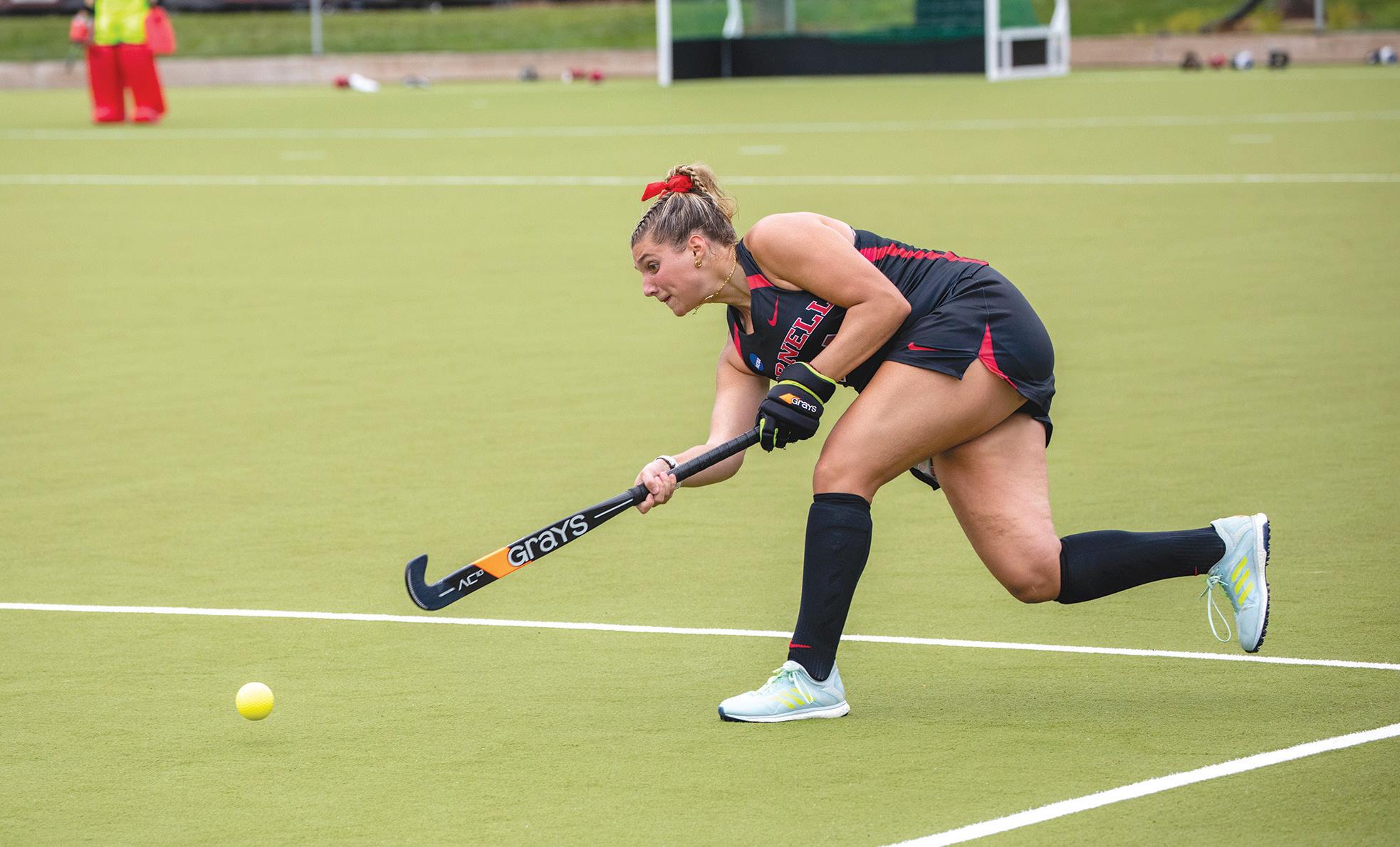
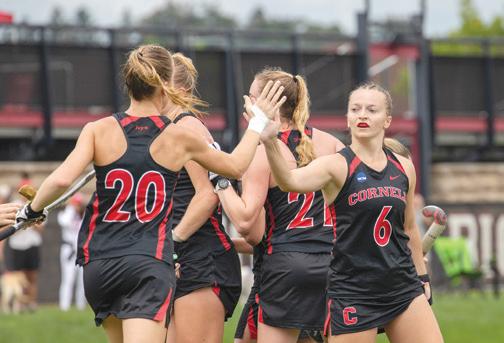
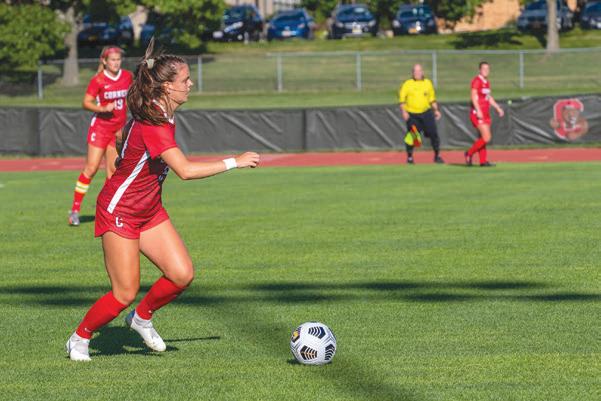 By RUTH ABRAHAM Sun Sports Editor
By RUTH ABRAHAM Sun Sports Editor
After losing its season opener on Wednesday, Sept. 6, against No. 7 Syracuse (4-0, 0-0 ACC), field hockey (1-2, 0-0 Ivy) looked to bounce back when it returned to Ithaca for the home opener against the University of Connecticut (1-4, 0-0 Big East) this past Friday, Sept. 8.
After falling behind early in the first quarter, the Red had to play defensively to stay within a goal. The Huskies held a 5-1 lead in shots, overtaking Cornell offensively.
Looking to break through, senior defender/midfielder Caroline Ramsey made a clutch save, allowing the momentum to swing back in Cornell’s favor. She then scored off two penalty corners late in the third and early in the fourth to take the lead over the Huskies.
Her second goal proved to be the game winner, with the Red taking the contest, 2-1. With her two goals over the Huskies, Ramsey moved into fifth-place on Cornell’s all-time scoring list.
Looking to sweep the home weekend, the Red faced University of Albany for a Sunday afternoon matchup. With the Great Danes (3-2, 0-0 America East) coming into Ithaca with a 9-3 all-time record
over the Red, Cornell was looking to flip the script.
Looking to break through, senior defender/ midfielder Caroline Ramsey made a clutch save, allowing the momentum to swing back in Cornell’s favor.
In a back and forth contest, the Red once again began on the defensive, with midfielder/defender Alison Smisdom of Albany scoring off a penalty corner in the first quarter. It was a sibling affair for the Red, starting with Caroline Ramsey scoring to tie up the game late in the second quarter.
Her sister, freshman defender Julia Ramsey, scored late in the fourth quarter to once again tie the game up after another goal by Smisdom. It was the younger Ramsey’s first collegiate goal.
With a tie after regulation, the game went to overtime. The Red outshot the Great Danes, 5-2, in the first overtime, but with no goals from either side, the game headed to double overtime.
The Red once again outshot UAlbany, this
time 4-0, but with no goals scored, the match went to a shootout. Both teams converted on their first two chances, but the Red fell behind with missed shots on its third and fourth attempts.
Freshman defender Julia Ramsey scored late in the fourth quarter to once again tie the game up...it was the younger Ramsey’s first collgiate goal.
With a miss and a goal for the Great Danes on its third and fourth chances, UAlbany sealed the win with a score on its fifth attempt, taking the shootout, 4-3, and a 3-2 overall win over the Red.
Cornell will head down to New York City to face Columbia on Friday, Sept. 15, at 6 p.m. to kick off Ivy League play. The Red will then return home on Sunday, Sept. 17, to face American University at Dodson Field at 2 p.m. Both games will be broadcast on ESPN+.
